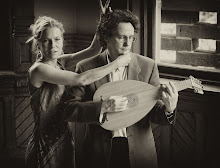Friday, October 5, 2012
Here's the program and notes for the Saturday Oct. 6th concert at Heliconian Hall. with Christopher Verrette and Justin Haynes
All lookes be pale Thomas Campion (1567-1620)
There is a Garden in her face Robert Jones (c. 1577-1617)
So, so, leave off Alfonso Ferrabosco II (c. 1575-1628)
Romanesca Angelo Notari? (1566-1663)
Ahi, che s’accrese in me Notari
Care charming sleep Robert Johnson (c. 1583-1634)
Three Masque Dances Anon.
Sir Francis Bacons Masque-Second of the Prince-The Second Witches Dance
Ben si qui mostra il Ciel Cipriano di Rore (1515-65) arr. Notari
Was I to blame? Ferrabosco
Come my Celia Ferrabosco
Tis now dead night John Coprario (c. 1570-1626)
The Lady Banning her Almand John Sturt (d. 1625)
Galliard Johnson
Intermission
Three lyra viol pieces Thomas Ford (c. 1580-1648)
And if you doe touch me ile crie-Forget me not- A pill to purge melancholie
Voi vedet’il mio mal Notari?
Ruggiero Notari?
Unto the temple of thy beauty Ford
Goe to bed sweete muze Jones
Like Hermit poor Ferrabosco
Prelude-Mrs. Hoffmans Alman Sturt
So parted you Coprario
Not full twelve years Ford
Ciaccona Notari?
Most of the ink spilled on the subject of Henry Frederick, Prince of Wales necessarily deals with ‘what ifs’. He was born at Stirling Castle in 1594, before it was certain his father James VI of Scotland would accede to Elizabeth I’s English throne and died of typhoid in November 1612. Whether he could have avoided the clash with Parliament that ended with his brother’s beheading (Henry was described as an ‘obdurate Protestant’ so would not have provoked the puritans) is one of the ‘what-ifs’, but his one accomplishment, the setting up of his own household with a glittering array of musicians, shows that English music would have been very different had he lived.
Henry’s music teacher was Alfonso Ferrabosco II, whose father had been lutenist (and spy) to Elizabeth I. Ferrabosco the Younger partnered with the poet Ben Jonson in the production of masques, balletic entertainments which grew, in Italy and France, into court opera. With plots that patted the attendant aristocrats on the back these events also afforded the opportunity for the young prince to show off his dancing skills as a participant. He may have danced gracefully to the prince’s dance we present after chasing off the witches who danced in the grotesque anti-masque. The text of Come my Celia is not from a masque, but from Jonson’s play Volpone. So, so, leave off is by John Donne and Like Hermit poor is by Walter Raleigh.
Campion, another famous poet, added his voice to the outpouring of sermons, verse and song composed after Henry’s death. As well as his own song All lookes be pale, he wrote the words for a cycle of songs with music by John Coprario. These songs have texts which each take the point of view of members of the royal family, then Britain (a new political concept in 1612) and the World. We present the songs to Queen Anne (Tis now dead night) and Henry’s younger sister Elizabeth (So parted you). Check the brochure for our concert celebrating her wedding to a German prince in February 1613.
John, or even sometimes Giovanni Coprario was in fact John Cooper. The fashion for things Italianate was cultivated at Henry’s court and more widely but Henry snagged himself a real live Italian in the person of Angelo Notari of Padua. In 1613 Notari published a book of Musiche for accompaniment con Tiorba, a very early example of Italian baroque music in Londres. The Cacciniesque Ahi, che s’accrese in me is from that collection, as are the viola bastarda divisions on the Rore madrigal. A manuscript in Notari’s handwriting in the British Library contains the other aria and the two sets of violin ‘divisions’ on the Ruggiero and Romanesca bass lines.
Other composers working at Henry’s court include Robert Johnson, who wrote for Shakespeare’s theatre company. Care charming sleep is from Valentinian, a play by John Fletcher and shows the influence that Notari had. Lutenist John Sturt (no relation) ended up in Henry’s entourage after a long soujourn on the continent. Thomas Ford, like most of Henry’s musicians, went on to work for Henry’s little brother Charles, but published no more music. The dedication of Jones’s songbook Ultimum Vale printed opposite gives an idea of the sense of hope invested this promising young man and lets us imagine the loss felt after his passing.
Subscribe to:
Post Comments (Atom)




2 comments:
Loved the programme! Click for my review.
Post a Comment